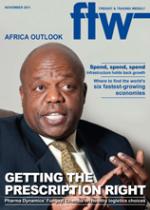Africa has experienced much
pain over recorded history
– wars, slavery, colonial
exploitation, the fallout from
the Cold War, famines, natural
disasters, corrupt governments,
nationalisation, infrastructural
decay, and disease.
So much so that the continent
was, until recently, written off by
the rest of the world as a source
of raw materials and dumping
ground for old technologies
and failed experiments at social
engineering.
In “the rest of the world” one
should include South Africa. The
mining and logistics companies
have been active for some time,
but it is only relatively recently
that we have seen South African
retailers, cellphone operators and
banks cross the borders.
This, despite the fact that,
according to Antonio Matos,
Mozambican chairman of the
Maputo Corridor Logistics
Initiative, six of the world’s
fastest-growing economies
between 2000 and 2010 were in
sub-Saharan Africa.
Neighbouring Mozambique has
shown consistent growth of over
7% from 2005. Its economy is
currently growing at 7.2% and is
expected to reach 7.5% in 2012,
making it the world’s fourthfastest
growing economy after
China, India and Ethiopia.
It is safe to assume that most
exporters still do not put Africa at
the top of the list of their priority
markets.
But – and here comes the
“gain” – all that is changing.
And the Chinese (themselves
an ignored market until the turn
of this century) no longer have
Africa to themselves.
An indicator of this is the large
number of African investment
conferences being organised
for Europeans and Americans
(ironically, the majority are not
held in Africa).
FTW’s team, in its visits to
neighbouring countries, has also
noticed the change over the past
few years. There are now fewer
Chinese nationals and foreign aid
workers in the lifts and breakfast
room. They have been replaced by
American, European, British and
South American business people.
With the world population
now having officially reached the
seven billion mark, talk around
the tables is as likely to include
food production and biofuels as it
is mining.
What is markedly different in
this new race for Africa is the
understanding that the people
of the countries in which the
companies are active also need to
benefit.
This is driven by a number of
factors, not the least of which is
governance.
Speaking at the release of
the 2011 Mo Ibrahim Index of
African Governance, founder
and chair of the foundation, Mo
Ibrahim, said “we have seen
this year that Africa’s young
majority are no longer willing to
stand for the selective approach
to governance adopted by many
of our continent’s governments.
Africa’s success stories are
delivering the whole range of
public goods and services that
citizens have a right to expect and
are forging a path that we hope
more will follow.”
More open governance
translates into a better place in
which to do business. According
to the 2011 IFC and World Bank
Doing Business 2012 report, 43
countries in sub-Saharan Africa
have made their regulatory
environment more businessfriendly
over the past six years.
The trend is continuing.
Other reports point to
Africa’s potential “demographic
dividend,” which sees Africa’s
growing percentage of young
people as the next wave of
opportunity after China’s boom.
Of course, there is still potential
for more pain – if China slows
down, and the rest of the world
stays in the economic doldrums,
export earnings from raw
materials will drop.
That may not be a bad thing.
What we understand now is that
Africa offers one of the world’s
biggest markets.
There is no reason why we
should not be using our own raw
materials to produce the products
needed and wanted by the people
of the continent.
Where the world’s six fastestgrowing economies reside
30 Nov 2011 - by Ed Richardson
0 Comments
Africa Outlook 2011

30 Nov 2011
30 Nov 2011
30 Nov 2011
30 Nov 2011
30 Nov 2011
30 Nov 2011
30 Nov 2011
30 Nov 2011
30 Nov 2011
Border Beat
1 hour ago
17 Jun 2025
Poll
Featured Jobs
New
New
